Description
The Great Lakes Commission is seeking a skilled, qualified and highly motivated executive assistant. The position performs a wide range of executive level support activities for the Great Lakes Commission and its staff. Duties of the executive assistant (described below) are grouped into four main categories: administrative support; executive communication/coordination; reception and events planning. This position requires an experienced person who can work within a team structure but also can exercise independent judgment in a busy, deadline-driven environment. This position will serve as the initial point of contact for all visitors, Commission staff, and some clients and partners and thus requires knowledge of operations, organizational culture and decision-making.
The executive assistant will bring a high level of knowledge and skill to a team of professionals working on a variety of projects supporting the Commission’s mandate to promote “the orderly, integrated and comprehensive development, use and conservation of the water resources of the Great Lakes Basin.” The Commission leads the development and advancement of policy and programs to achieve the collective interests of the eight states and two provinces in the Great Lakes Basin. This position, reporting to the Commission’s executive director, will assist in the development and delivery of professional administrative services and support for the Commission and its staff.
Requirements
A high school diploma (or equivalent) is required; some college (associate’s or bachelor’s degree) is preferred. Six years of full-time office employment involving high level administrative, executive communication/coordination and events planning support experience, including three years of advanced executive and administrative leadership, is required.
The incumbent must be able to work under broad guidelines, select the best course of action from a number of alternatives, and work independently to set priorities.
Responsibilities/Duties
The responsibilities/duties of the executive assistant are organized under the following categories:
Administrative Support
- Establishes and manages paper and electronic filing systems.
- Monitors the office calendar.
- Works with state and provincial governments to coordinate commissioner appointments, manages and maintains Commission membership rosters and updates rosters on the Commission website.
- Updates databases and listservs for Commission operations.
- Manages incoming and outgoing mail and shipping services.
Executive Communication/Coordination
- Schedules and confirms appointments.
- Assists the executive director to plan, prepare and distribute agendas for all staff meetings, senior management team meetings and monthly Board call meetings.
- Attends Board and staff meetings; composes and distributes notes and minutes.
- Tracks and follows up on meeting assignments as needed.
- Prepares correspondence upon request; proofreads and edits correspondence for executive director and senior management team.
- Conducts basic research in support of projects and other Commission initiatives.
- Assists in the preparation of presentations for executive director and senior managers.
Reception
- Answers the telephone, takes messages, directs callers to appropriate staff members and provides general guidance to callers seeking information.
- Greets visitors, clients and partners and manages inquiries.
- Composes responses (emails, letters, memoranda) in response to inquiries and incoming calls.
- Provides logistical support for in-house meetings and coordinates office events such as luncheons, staff meetings and receptions.
Events Planning
- Leads the Commission’s meeting arrangements processes; ensures preparation and distribution of meeting notices (electronically, hard-copy, and on the commissions website) and prompt distribution of meeting minutes and leads the process for briefing book preparation and distribution.
- Secures venues for Commission meetings (currently three major meetings per year).
- Manages/arranges staff travel for meetings.
- Coordinates with hotel/conference center staff and the host state/province regarding logistics for meetings, social events and field trips, etc.
- Negotiates and manages vendor contracts and payments; ensuring events stay on budget.
- Manages and oversees meetings on-site, including problem-solving, directing event set-up, communicating with staff, organizing vendors, and managing break down.
- Manages online registrations and payments.
- Supports preparation of meeting materials, including nametags, briefing books and other items.
- Drafts event communications, including social media posts, email announcements, etc.
- Maintains inventory of meeting equipment and supplies.
Skills and Experience
- At least six years of full-time executive level experience in professional settings of increasing responsibility with a focus on administration, operations, communications, events planning, marketing or a similar discipline.
- Demonstrated ability to communicate effectively with diverse partners and clients.
- Ability to perform well under pressure.
- Excellent organizational skills, including meticulous attention to detail.
- Proficiency with the Microsoft© suite of products (e.g., Word, Excel, PowerPoint, etc.) and email.
- Experience with databases and webinar services preferred.
- Ability to use and troubleshoot office equipment such as phones, copiers, printers, scanners, etc.
- Ability to type quickly and accurately in a public meeting setting.
- Ability to work professionally and effectively with service providers, vendors and outside clients.
Position Classification, Compensation and Benefits
The posted position is considered a “regular full-time” “benefits eligible” position as defined by the Commission’s personnel policies. The anticipated starting salary for the position of executive assistant will range between $61,000 and $64,000 per year depending on education, skills and experience. The Commission may choose to downgrade this position and fill it at the “administrative assistant” level, determined by the qualifications and experience level of the applicants. The Commission offers comprehensive benefits, including generous leave time, flexible schedules, medical, dental and vision insurance, and a retirement match program.
Work Environment
The Commission is located in Ann Arbor, Michigan. This position does require a consistent in-office presence although remote work and compressed and flex schedules may be considered upon mutual agreement between the employee and his/her supervisor. This position requires some travel.
Application Process
To apply for this position, applicants must submit a cover letter and resume clearly stating the applicant’s interest and qualifications. Please note: All required items must be provided prior to the posting deadline for an application to be considered.
Please submit a complete application, including all required materials in a single e-mail by April 1, 2020 to: vacancy@glc.org
No phone calls please.
About the Great Lakes Commission
The Great Lakes Commission is an intergovernmental agency created by the eight Great Lakes states and Congress to protect and wisely manage the Great Lakes, acting under the authorities of the Great Lakes Basin Compact of 1955. In 1968, Congress passed an Act authorizing its consent to the Compact. Since 1999, the Canadian provinces of Ontario and Québec have served as associate members. The states and provinces are represented on the GLC by delegation members appointed by each jurisdiction. The Commission is an integral component of the governance structure of the Great Lakes Basin—enabling party states and provinces to develop consensus around a common agency table, and then to speak with a unified, powerful voice on behalf of the Great Lakes-St. Lawrence River region and its 48 million residents. The Commission also invests in a wide range of project priorities for states, provinces and the Great Lakes Basin. Learn more at www.glc.org.
Note: The Great Lakes Commission strives to create an inclusive, diverse and non-discriminatory workplace. The Commission is an equal opportunity employer and complies with applicable federal and state laws prohibiting discrimination. It is the policy of the Great Lakes Commission that no person shall be discriminated against, as an employee or applicant for employment, because of race, color, national origin, religion, age, sex, height, weight, sexual orientation, gender expression, marital status, political affiliation, or a disability or genetic information that is unrelated to the person’s ability to perform the duties of a particular job or position.



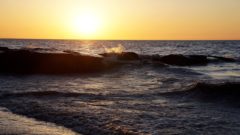

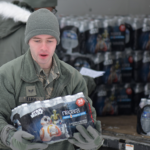

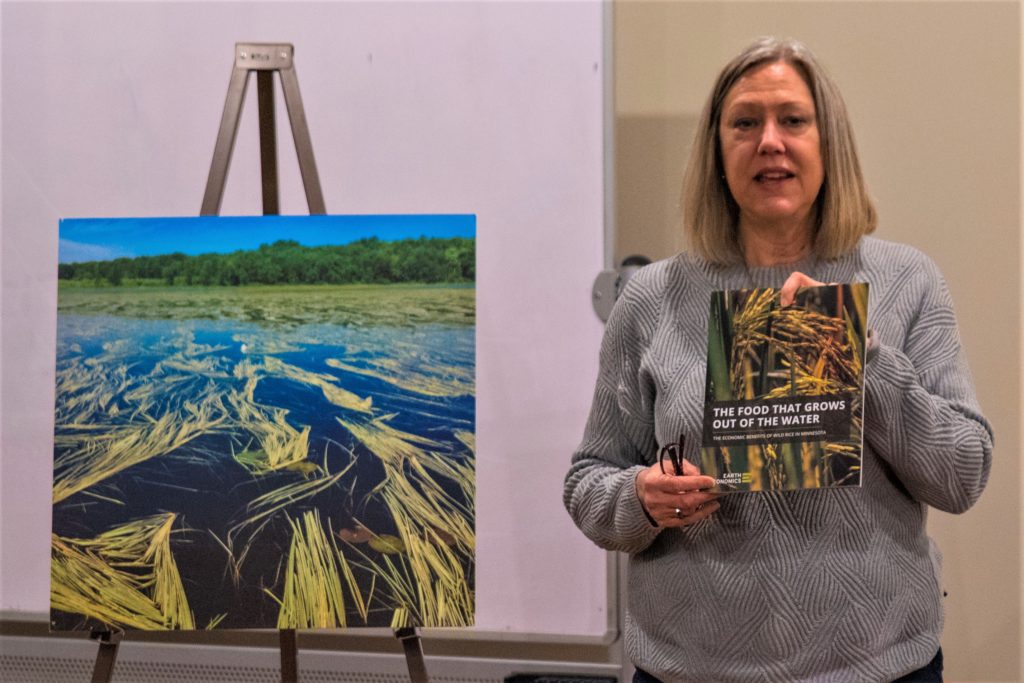
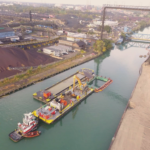


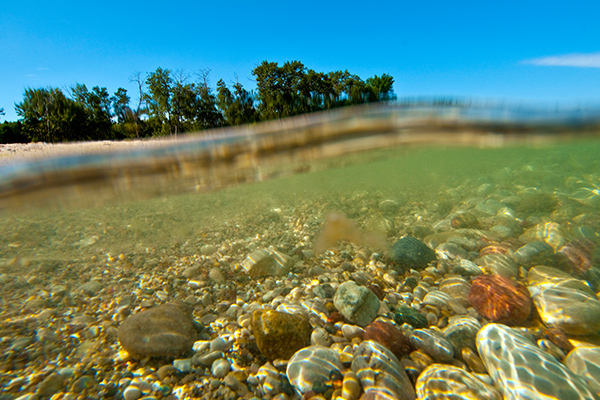
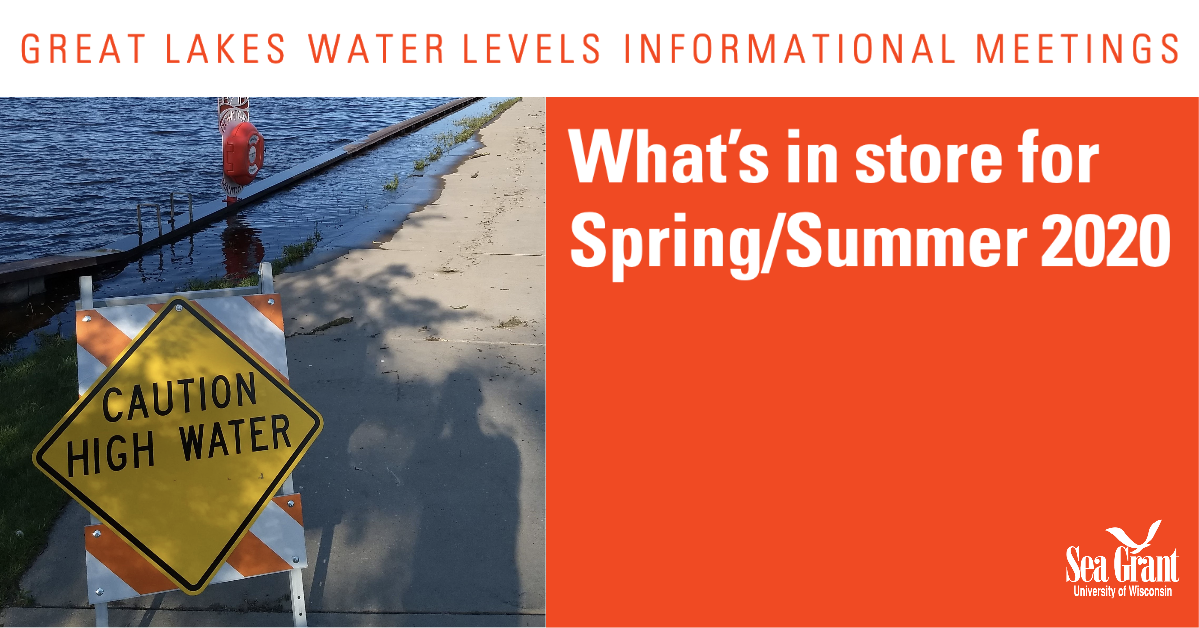 Great Lakes water levels have been at or near record highs in recent months, prompting concern among many Wisconsin residents.
Great Lakes water levels have been at or near record highs in recent months, prompting concern among many Wisconsin residents.
